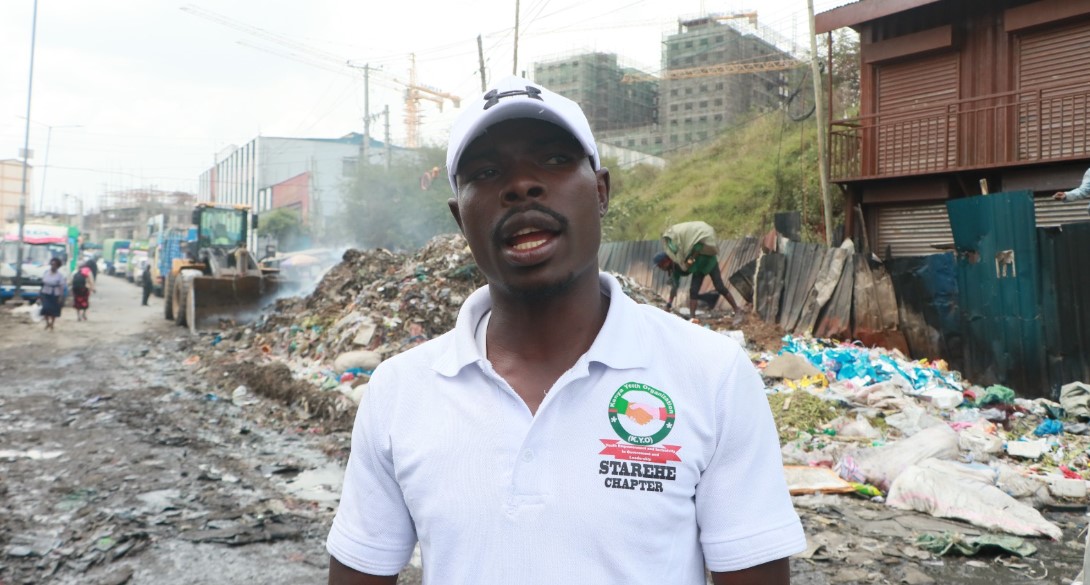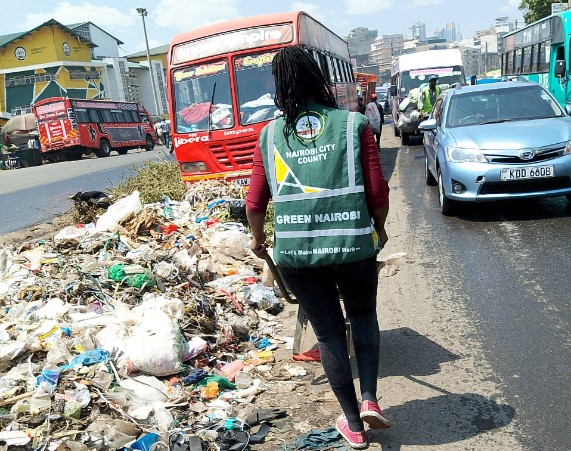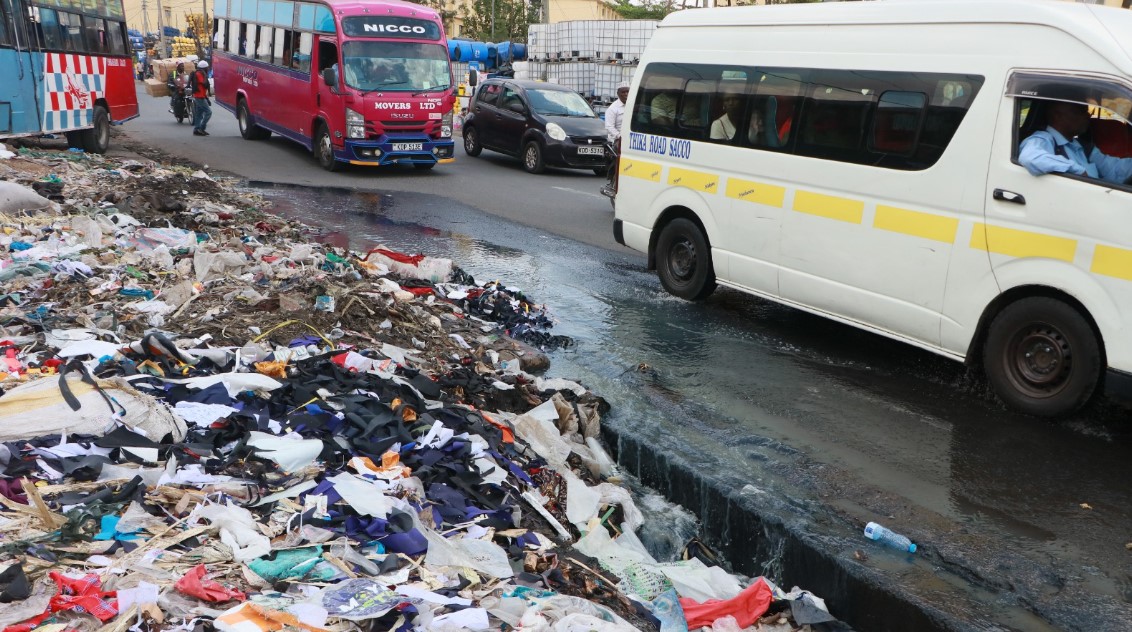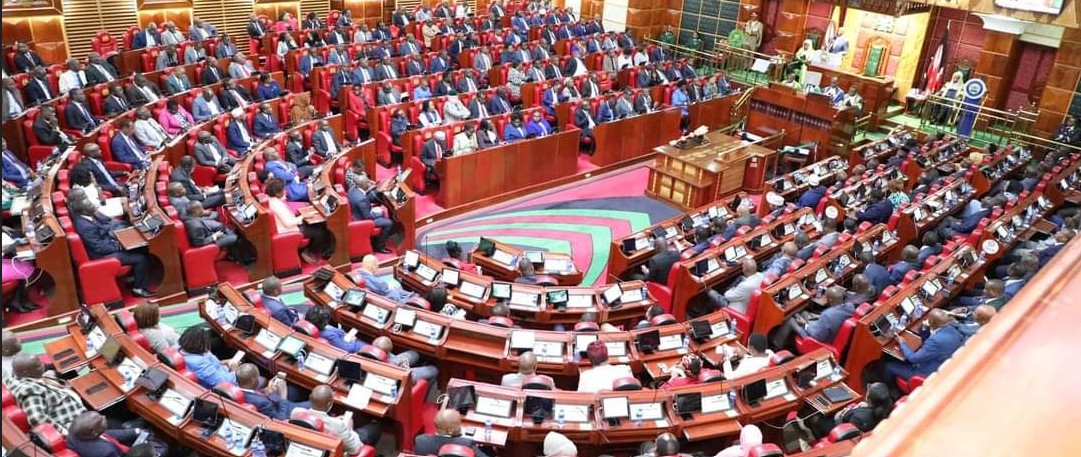Kariokor residents protest over garbage, burst sewers and Sakaja's inaction
The residents lament that the sewer leakages have been there for a long time, causing ugly sights.
Traders and residents of Kariokor in Nairobi have raised concern over several burst sewers and heaps of garbage dumped along Race Course Road, saying they risk contracting diseases.
Led by Kariokor Mechanics Association Chairperson John Obala, the residents and traders threatened to protest if Nairobi Governor Sakaja does not order the removal of the garbage and the repair of the broken sewer systems.
More To Read
- From waste to water tanks: How Kariokor youth are turning Nairobi’s trash into livelihoods
- Thread by thread: Kariokor’s women weavers stitch culture, resilience, and hope into every bag
- Nairobi County turns to new firm for garbage collection
- Why Eastleigh's garbage problem could soon be a thing of the past
- Nairobi’s Green Army shifts clean-up focus from CBD to residential areas
- Nairobi's CBD businesses ordered to subscribe to licensed waste collectors or face penalties
When The Eastleigh Voice visited Race Course Road and parts of Kariakor, there was massive evidence of dumped garbage and burst sewer spilling raw sewage on the road, with motorists struggling to manoeuvre through the mess.
"We will have no alternative but to stage protests because there have been complaints about the state of pollution here for a very long time, yet the county government has not done anything," said Obala.
Obala and other traders said it is shocking that people believed to be working with the county are the ones dumping the garbage around the area.
Photos and videos obtained by The Eastleigh Voice show how employees of the county, who are tasked with managing garbage in the city, are dumping trash using gunny bags.
 Teddy Obala, Chairperson of Kariokor Mechanics Association, speaking to The Eastleigh Voice about the garbage and raw sewer menace on Race Course Road. (Photo: Barack Oduor)
Teddy Obala, Chairperson of Kariokor Mechanics Association, speaking to The Eastleigh Voice about the garbage and raw sewer menace on Race Course Road. (Photo: Barack Oduor)
Foul smell
Teddy Kavuka, who repairs refrigerators around Race Course Road, said the foul smell emanating from burst sewers has made it impossible for their clients to visit their shops.
"The heavy and unpleasant smell from burst sewerage is denying us customers. Nobody would want to experience the foul smell and still jump over burst sewers trying to evade stepping into open manholes," said Kavuka.
Race Course Road and several parts of Kariokor struggle with serious drainage problems, which causes sewage to leak onto the streets. This is in addition to piles of uncollected garbage which line the neighbourhood.
Many residents of Kariokor lack running water, toilets and proper solid waste disposal systems. The residents lament that the sewer leakages have been there for a long time, causing ugly sights.
Mary Muthoni who plies her trade around Mwariro Market, said the county government has never bothered to repair the broken sewers.
"I remember it was still there when we were kids. It has leaked for that long. One cannot walk through the road without being splashed by filth. It gets worse during the rainy seasons. Floods everywhere. Nothing passes," Muthoni said.
The residents also say that the situation is highly dangerous for children who are bound to play in such areas, hence getting exposed to a lot of risks.
 A woman wearing a Nairobi City County worker’s jacket is seen dumping garbage on the roadside in Kariokor on October 18, 2024. (Photo: Barack Oduor)
A woman wearing a Nairobi City County worker’s jacket is seen dumping garbage on the roadside in Kariokor on October 18, 2024. (Photo: Barack Oduor)
In April this year, Sakaja explained why the garbage menace in the county has been a systemic issue, dating back years.
Sakaja cited the previous administration as the root cause of the delayed solution to the perennial problem.
He blamed the private sector, which had previously been contracted by the county government to collect garbage, saying they would collect payments based on the weight of the garbage disposed per day, which would be hiked in their favour.
Sakaja said that per day, the private contractors claimed they collected 9,000 tonnes of garbage instead of the three tonnes produced, adding that they would also dump the waste at illegal dumpsites.
 Motorists drive on raw sewage flowing along Race Course Road in Nairobi with garbage dumped on the roadside. (Photo: Barack Oduor)
Motorists drive on raw sewage flowing along Race Course Road in Nairobi with garbage dumped on the roadside. (Photo: Barack Oduor)
"The model for garbage collection was completely unsustainable. It was just business and so we would pay contractors just because of the weight of the garbage we deliver at our final disposal site in Dandora," said Sakaja.
"A lot of the bills were unattainable because if you calculated the weight they were charging, it would look as if you collect 9,000 tonnes of garbage every day yet we know that Nairobi collects about three tonnes every day."
On how his administration has resolved to handle the menace, the county boss said he is focusing on building capacity for collection, using modern garbage conversion techniques, and employing youth to act as environmental officers.
Top Stories Today















































